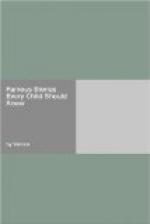The thought of Dorothea kept nipping his heart and his conscience with a hard squeeze now and then; but he thought to himself, “If I can take her back Hirschvogel then how pleased she will be, and how little ’Gilda will clap her hands!” He was not at all selfish in his love for Hirschvogel: he wanted it for them all at home quite as much as for himself. There was at the bottom of his mind a kind of ache of shame that his father—his own father—should have stripped their hearth and sold their honour thus.
A robin had been perched upon a stone griffin sculptured on a house-eave near. August had felt for the crumbs of his loaf in his pocket, and had thrown them to the little bird sitting so easily on the frozen snow.
In the darkness where he was he now heard a little song, made faint by the stove-wall and the window-glass that was between him and it, but still distinct and exquisitely sweet. It was the robin, singing after feeding on the crumbs. August, as he heard, burst into tears. He thought of Dorothea, who every morning threw out some grain or some bread on the snow before the church. “What use is it going there,” she said, “if we forget the sweetest creatures God has made?” Poor Dorothea! Poor, good, tender, much-burdened little soul! He thought of her till his tears ran like rain.
Yet it never once occurred to him to dream of going home. Hirschvogel was here.
Presently the key turned in the lock of the door; he heard heavy footsteps and the voice of the man who had said to his father, “You have a little mad dog; muzzle him!” The voice said, “Ay, ay, you have called me a fool many times. Now you shall see what I have gotten for two hundred dirty florins. Potztausend! never did you do such a stroke of work.”
Then the other voice grumbled and swore, and the steps of the two men approached more closely, and the heart of the child went pit-a-pat, pit-a-pat, as a mouse’s does when it is on the top of a cheese and hears a housemaid’s broom sweeping near. They began to strip the stove of its wrappings: that he could tell by the noise they made with the hay and the straw. Soon they had stripped it wholly; that too, he knew by the oaths and exclamations of wonder and surprise and rapture which broke from the man who had not seen it before.




